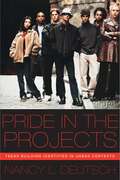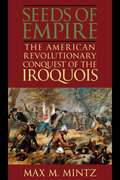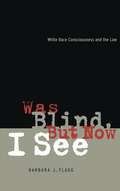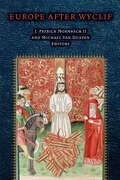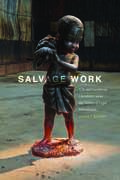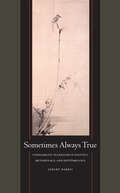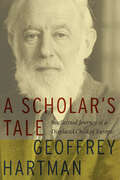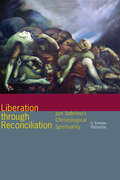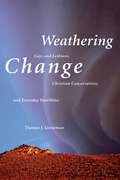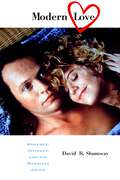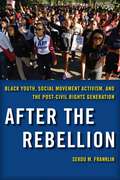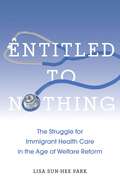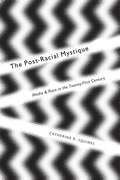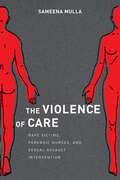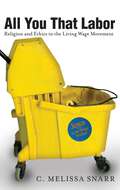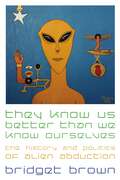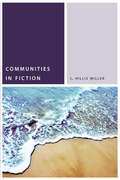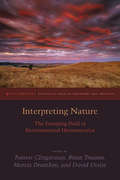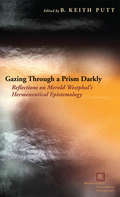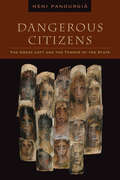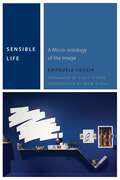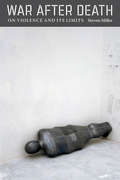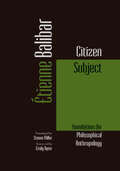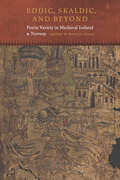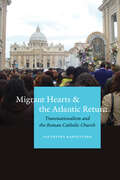- Table View
- List View
Pride in the Projects: Teens Building Identities in Urban Contexts (Qualitative Studies in Psychology #5)
by Nancy L. DeutschTeens in America’s inner cities grow up and construct identities amidst a landscape of relationships and violence, support and discrimination, games and gangs. In such contexts, local environments such as after-school programs may help youth to mediate between social stereotypes and daily experience, or provide space for them to consider themselves as contributing members of a community.Based on four years of field work with both the adolescent members and staff of an inner-city youth organization in a large Midwestern city, Pride in the Projects examines the construction of identity as it occurs within this local context, emphasizing the relationships within which identities are formed. Drawing on research in psychology, sociology, education, and race and gender studies, the volume highlights the inadequacies in current identity development theories, expanding our understanding of the lives of urban teens and the ways in which interpersonal connections serve as powerful contexts for self-construction. The adolescents’ stories illuminate how they find ways to discover who they are, and who they would like to be — in positive and healthy ways — in the face of very real obstacles. The book closes with implications for practice, alerting scholars, educators, practitioners, and concerned citizens of the positive developmental possibilities inherent in youth settings when we pay attention to the voices of youth.
Seeds of Empire: The American Revolutionary Conquest of the Iroquois
by Max M. MintzSeeds of Empire recreates the events surrounding General John Sullivan's scorched-earth campaign against the Six Nations of the American Indians of New York and the Eastern territories in 1779, following the surrender of General John Burgoyne's British army at the Battle of Saratoga. Mintz's meticulous historical research and renowned storytelling ability give life to this arresting narrative as it probes the mechanisms of the American Revolution and the structure and function of the Iroquois Six Nations.
Was Blind, But Now I See: White Race Concsiousness and the Law (Critical America #61)
by Barbara J. FlaggRace does not speak to most white people. Rather, whites tend to associate race with people of color and to equate whiteness with racelessness. As Barbara J. Flagg demonstrates in this important book, this "transparency" phenomenon—the invisibility of whiteness to white people—profoundly affects the ways in whites make decisions: they rely on criteria perceived by the decision maker as race-neutral but which in fact reflect white, race-specific norms. Flagg here identifies this transparently white decision making as a form of institutional racism that contributes significantly, though unobtrusively, to the maintenance of white supremacy. Bringing the discussion to bear on the arena of law, Flagg analyzes key areas of race discrimination law and makes the case for reforms that would bring legal doctrine into greater harmony with the recognition of institutional racism in general and the transparency phenomenon in particular. She concludes with an exploration of the meaning of whiteness in a pluralist culture, paving the way for a positive, nonracist conception of whiteness as a distinct racial identity. An informed and substantive call for doctrinal reform, Was Blind But Now I See is the most expansive treatment yet of the relationship between whiteness and law.
Europe After Wyclif (Fordham Series in Medieval Studies)
by J. Patrick Hornbeck II and Michael Van DussenThis volume brings together scholarship that discusses late-medieval religious controversy on a pan-European scale, with particular attention to developments in England, Bohemia, and at the general councils of the fifteenth century. Controversies such as those that developed in England and Bohemia have received ample attention for decades, and recent scholarship has introduced valuable perspectives and findings to our knowledge of these aspects of European religion, literature, history, and thought.Yet until recently, scholars working on these controversies have tended to work in regional isolation, a practice that has given rise to the impression that the controversies were more or less insular, their significance measured in terms of their local or regional influence. Europe After Wyclif was designed specifically to encourage analysis of cultural cross-currents—the ways in which regional controversies, while still products of their own environments and of local significance, were inseparable from cultural developments that were experienced internationally.
Salvage Work: U.S. and Caribbean Literatures amid the Debris of Legal Personhood
by Angela NaimouSalvage Work examines contemporary literary responses to the law’s construction of personhood in the Americas. Tracking the extraordinary afterlives of the legal slave personality from the nineteenth century into the twenty-first, Angela Naimou shows the legal slave to be a fractured but generative figure for contemporary legal personhood across categories of race, citizenship, gender, and labor. What emerges is a compelling and original study of how law invents categories of identification and how literature contends with the person as a legal fiction. Through readings of Francisco Goldman’s The Ordinary Seaman, Edwidge Danticat’s Krik?Krak!, Rosario Ferre’s Sweet Diamond Dust (Maldito Amor), Gayl Jones’s Song for Anninho and Mosquito, and John Edgar Wideman’s Fanon, Naimou shows how literary engagements with legal personhood reconfigure formal narrative conventions in Black Atlantic historiography, the immigrant novel, the anticolonial romance, the trope of the talking book, and the bildungsroman.Revealing links between colonial, civic, slave, labor, immigration, and penal law, Salvage Work reframes debates over civil and human rights by revealing the shared hemispheric histories and effects of legal personhood across seemingly disparate identities—including the human and the corporate person, the political refugee and the economic migrant, and the stateless person and the citizen.In depicting the material remains of the legal slave personality in the de-industrialized neoliberal era, these literary texts develop a salvage aesthetic that invites us to rethink our political and aesthetic imagination of personhood. Questioning liberal frameworks for civil and human rights as well as what Naimou calls death-bound theories of personhood—in which forms of human life are primarily described as wasted, disposable, bare, or dead in law—Salvage Work thus responds to critical discussions of biopolitics and neoliberal globalization by exploring the potential for contemporary literature to reclaim the individual from the legal regimes that have marked her.
Sometimes Always True: Undogmatic Pluralism in Politics, Metaphysics, and Epistemology
by Jeremy BarrisSometimes Always True aims to resolve three connected problems. First, we need an undogmatic pluralist standpoint in political theory, metaphysics, and epistemology. But genuine pluralism suffers from the contradiction that making room for fundamental differences in outlook means making room for outlooks that exclude pluralism.Second, philosophy involves reflecting on the world and meaning as a whole, yet this means adopting a vantage point in some way outside of meaning.Third, our lived experience of the sense of our lives similarly undermines its own sense, as it involves having a vantage point in some way wholly outside ourselves.In detailed engagement with, among others, Davidson, Rorty, Heidegger, Foucault, Wilde, and gender and sexuality theory, the book argues that these contradictions are so thoroughgoing that, like the liar’s paradox, they cancel the bases of their own meaning. Consequently, it argues, they resolve themselves and do so in a way that produces a vantage point on these issues that is not dogmatically circular because it is, workably, both within and outside these issues’ sense. The solution to a genuinely undogmatic pluralism, then, is to enter into these contradictions and the process of their self-resolution.
A Scholar's Tale: Intellectual Journey of a Displaced Child of Europe
by Geoffrey HartmanFor more than fifty years, Geoffrey Hartman has been a pivotal figure in the humanities. In his first book, in 1954, he helped establish the study of Romanticism as key to the problems of modernity. Later, his writings were crucial to the explosive developments in literary theory in the late seventies, and he was a pioneer in Jewish studies, trauma studies, and studies of the Holocaust. At Yale, he was a founder of its Judaic Studies program, as well as of the first major video archive for Holocaust testimonies.Generations of students have benefited from Hartman’s generosity, his penetrating and incisive questioning, the wizardry of his close reading, and his sense that the work of a literary scholar, no less than that of an artist, is a creative act. All these qualities shine forth in this intellectual memoir, which will stand as his autobiography. Hartman describes his early education, uncanny sense of vocation, and development as a literary scholar and cultural critic. He looks back at how his career was influenced by his experience, at the age of nine, of being a refugee from Nazi Germany in the Kindertransport. He spent the next six years at school in England, where he developed his love of English literature and the English countryside, before leaving to join his mother in America.Hartman treats us to a “biobibliography” of his engagements with the major trends in literary criticism. He covers the exciting period at Yale handled so controversially by the media and gives us vivid portraits, in particular, of Harold Bloom, Paul de Man, and Jacques Derrida.All this is set in the context of his gradual self-awareness of what scholarship implies and how his personal displacements strengthened his calling to mediate between European and American literary cultures. Anyone looking for a rich, intelligible account of the last half-century of combative literary studies will want to read Geoffrey Hartman’s unapologetic scholar’s tale.
Liberation through Reconciliation: Jon Sobrino's Christological Spirituality
by O. Ernesto ValienteIn the past one hundred years alone, more than 200 million people have been killed as a consequence of systematic repression, political revolutions, or ethnic or religious war. The legacy of such violence lingers long after the immediate conflict. Drawing on the author’s experiences of his native El Salvador, Liberation through Reconciliation builds on Jon Sobrino’s thought to construct a Christian spirituality and theology of reconciliation that overcomes conflict by attending to the demands of truth, justice, and forgiveness.
Weathering Change: Gays and Lesbians, Christian Conservatives, and Everyday Hostilities
by Thomas J. LinnemanThe Pacific Northwest is known for its diverse, unusual politics. There are thriving gay and lesbian communities and populations of staunchly conservative Christians. Both groups wield political power out of proportion to their numbers and yet both feel beleaguered. How do members of these groups—both community leaders and everyday citizens—perceive the political climates that surround them This book tells a tale of two Northwestern cities: Seattle, well known nationally for its liberalism, and Spokane, its conservative cousin to the east. Weathering Change characterizes the ways these liberal and conservative environments translate into hostility and hospitality for the Christian conservatives, gay men, and lesbians who live within them. Linneman gives us a firsthand account of how people from both groups think about social change in relation to the media, the public, the government, their communities, and their opposition. Indeed, we gain much needed insight into why Christian conservatives view the progress of the gay and lesbian movement as such a threat.
Modern Love: Romance, Intimacy, and the Marriage Crisis
by David Shumway“My ideas of romance came from the movies,” said Woody Allen, and it is to the movies—as well as to novels, advice columns, and self-help books—that David Shumway turns for his history of modern love.Modern Love argues that a crisis in the meaning and experience of marriage emerged when it lost its institutional function of controlling the distribution of property, and instead came to be seen as a locus for feelings of desire, togetherness, and loss. Over the course of the twentieth century, partly in response to this crisis, a new language of love—“intimacy”—emerged, not so much replacing but rather coexisting with the earlier language of “romance.” Reading a wide range of texts, from early twentieth-century advice columns and their late twentieth-century antecedent, the relationship self-help book, to Hollywood screwball comedies, and from the “relationship films” of Woody Allen and his successors to contemporary realist novels about marriages, Shumway argues that the kinds of stories the culture has told itself have changed. Part layperson’s history of marriage and romance, part meditation on intimacy itself, Modern Love will be both amusing and interesting to almost anyone who thinks about relationships (and who doesn’t?).
After the Rebellion: Black Youth, Social Movement Activism, and the Post-Civil Rights Generation
by Sekou M. FranklinAn essential examination of black youth activism since the passage of the 1964 Civil Rights ActWhat happened to black youth in the post-civil rights generation? What kind of causes did they rally around and were they even rallying in the first place? After the Rebellion takes a close look at a variety of key civil rights groups across the country over the last 40 years to provide a broad view of black youth and social movement activism. Based on both research from a diverse collection of archives and interviews with youth activists, advocates, and grassroots organizers, this book examines popular mobilization among the generation of activists—principally black students, youth, and young adults—who came of age after the passage of the 1964 Civil Rights Act and the Voting Rights Act of 1965. Franklin argues that the political environment in the post-Civil Rights era, along with constraints on social activism, made it particularly difficult for young black activists to start and sustain popular mobilization campaigns. Building on case studies from around the country—including New York, the Carolinas, California, Louisiana, and Baltimore—After the Rebellion explores the inner workings and end results of activist groups such as the Southern Negro Youth Congress, Student Nonviolent Coordinating Committee, the Student Organization for Black Unity, the Free South Africa Campaign, the New Haven Youth Movement, the Black Student Leadership Network, the Juvenile Justice Reform Movement, and the AFL-CIO’s Union Summer campaign. Franklin demonstrates how youth-based movements and intergenerational campaigns have attempted to circumvent modern constraints, providing insight into how the very inner workings of these organizations have and have not been effective in creating change and involving youth. A powerful work of both historical and political analysis, After the Rebellion provides a vivid explanation of what happened to the militant impulse of young people since the demobilization of the civil rights and black power movements—a discussion with great implications for the study of generational politics, racial and black politics, and social movements.
Entitled to Nothing: The Struggle for Immigrant Health Care in the Age of Welfare Reform (Nation of Nations #29)
by Lisa Sun-Hee ParkIn Entitled to Nothing, Lisa Sun-Hee Park investigates how the politics of immigration, health care, and welfare are intertwined. Documenting the formal return of the immigrant as a “public charge,” or a burden upon the State, the author shows how the concept has been revived as states adopt punitive policies targeting immigrants of color and require them to “pay back” benefits for which they are legally eligible during a time of intense debate regarding welfare reform. Park argues that the notions of “public charge” and “public burden” were reinvigorated in the 1990s to target immigrant women of reproductive age for deportation and as part of a larger project of “disciplining” immigrants. Drawing on nearly 200 interviews with immigrant organizations, government agencies and safety net providers, as well as careful tracking of policies and media coverage, Park provides vivid, first-person accounts of how struggles over the “public charge” doctrine unfolded on the ground, as well as its consequences for the immigrant community. Ultimately, she shows that the concept of “public charge” continues to lurk in the background, structuring our conception of who can legitimately access public programs and of the moral economy of work and citizenship in the U.S., and makes important policy suggestions for reforming our immigration system.
The Post-Racial Mystique: Media and Race in the Twenty-First Century (Critical Cultural Communication #25)
by Catherine SquiresDespite claims frompundits and politicians that we now live in a post-racial America, people seemto keep finding ways to talk about race—from celebrations of the inaugurationof the first Black president to resurgent debates about policeprofiling, race and racism remain salient features of our world. When facedwith fervent anti-immigration sentiments, record incarceration rates of Blacks andLatinos, and deepening socio-economic disparities, a new question has eruptedin the last decade: What does being post-racial mean?The Post-Racial Mystique exploreshow a variety of media—the news, network television, and online, independent media—debate,define and deploy the term “post-racial” in their representations of Americanpolitics and society. Using examples from both mainstream and niche media—from prime-time television series to specialty Christian media and audienceinteractions on social media—Catherine Squires draws upon a variety ofdisciplines including communication studies, sociology, political science, andcultural studies in order to understand emergent strategies for framingpost-racial America. She reveals the ways in which media texts cast U.S.history, re-imagine interpersonal relationships, employ statistics, andinventively redeploy other identity categories in a quest to formulatedifferent ways of responding to race.
The Violence of Care: Rape Victims, Forensic Nurses, and Sexual Assault Intervention
by Sameena MullaWinner, 2017 Margaret Mead Award presented by the American Anthropological Association and the Society for Applied AnthropologyHonorable Mention, 2015 Eileen Basker Memorial Prize presented by the Society for Medical Anthropology Analyzes the ways in which nurses work to collect and preserve evidence while addressing the needs of sexual assault victims as patientsEvery year in the US, thousands of women and hundreds of men participate in sexual assault forensic examinations. Drawing on four years of participatory research in a Baltimore emergency room, Sameena Mulla reveals the realities of sexual assault response in the forensic age. Taking an approach developed at the intersection of medical and legal anthropology, she analyzes the ways in which nurses work to collect and preserve evidence while addressing the needs of sexual assault victims as patients.Mulla argues that blending the work of care and forensic investigation into a single intervention shapes how victims of violence understand their own suffering, recovery, and access to justice—in short, what it means to be a “victim”. As nurses race the clock to preserve biological evidence, institutional practices, technologies, and even state requirements for documentation undermine the way in which they are able to offer psychological and physical care. Yet most of the evidence they collect never reaches the courtroom and does little to increase the number of guilty verdicts. Mulla illustrates the violence of care with painstaking detail, illuminating why victims continue to experience what many call “secondary rape” during forensic intervention, even as forensic nursing is increasingly professionalized. Revictimization can occur even at the hands of conscientious nurses, simply because they are governed by institutional requirements that shape their practices.The Violence of Care challenges the uncritical adoption of forensic practice in sexual assault intervention and post-rape care, showing how forensic intervention profoundly impacts the experiences of violence, justice, healing and recovery for victims of rape and sexual assault.
All You That Labor: Religion and Ethics in the Living Wage Movement (Religion and Social Transformation #10)
by C. Melissa Snarr“Come to me, all you that labor and are heavy laden, and I will give you rest.”Mathew 11:28 (AKJV)In the early 1990s, a grassroots coalition of churches in Baltimore, Maryland helped launch what would become a national movement. Joining forces with labor and low-wage worker organizations, they passed the first municipal living wage ordinance. Since then, over 144 municipalities and counties as well as numerous universities and local businesses in the United States have enacted such ordinances.Although religious persons and organizations have been important both in the origins of the living wage movement and in its continuing success, they are often ignored or under analyzed. Drawing on participant observation in multiple cities, All You That Labor analyzes and evaluates the contributions of religious activists to the movement. The book explores the ways religious organizations do this work in concert with low-wage workers, the challenges religious activists face, and how people of faith might better nurture moral agency in relation to the political economy. Ultimately, C. Melissa Snarr provides clarity on how to continue to cultivate, renew, and expand religious resources dedicated to the moral agency of low-wage workers and their allies.
They Know Us Better Than We Know Ourselves: The History and Politics of Alien Abduction
by Bridget BrownWhat's really behind Americans' persistent belief in alien abductions?Since its emergence in the 1960s, belief in alien abduction has saturated popular culture, with the ubiquitous image of the almond-eyed alien appearing on everything from bumper stickers to bars of soap. Drawing on interviews with alleged abductees from the New York area, Bridget Brown suggests a new way for people to think about the alien phenomenon, one that is concerned not with establishing whether aliens actually exist, but with understanding what belief in aliens in America may tell us about our changing understanding of ourselves and our place in the world. They Know Us Better Than We Know Ourselves looks at how the belief in abduction by extraterrestrials is constituted by and through popular discourse and the images provided by print, film, and television. Brown contends that the abduction phenomenon is symptomatic of a period during which people have come to feel increasingly divested of the ability to know what is real or true about themselves and the world in which they live. The alien abduction phenomenon helps us think about how people who feel left out create their own stories and fashion truths that square with their own experience of the world.
Communities in Fiction (Commonalities)
by J. Hillis MillerCommunities in Fiction reads six novels or stories (one each by Trollope, Hardy, Conrad, Woolf, Pynchon, and Cervantes) in the light of theories of community worked out (contradictorily) by Raymond Williams, Martin Heidegger, and Jean- Luc Nancy.The book’s topic is the question of how communities or noncommunities are represented in fictional works. Such fictional communities help the reader understand real communities, including those in which the reader lives. As against the presumption that the trajectory in literature from Victorian to modern to postmodern is the story of a gradual loss of belief in the possibility of community, this book demonstrates that communities have always been presented in fiction as precarious and fractured. Moreover, the juxtaposition of Pynchon and Cervantes in the last chapter demonstrates that period characterizations are never to be trusted. All the features both thematic and formal that recent critics and theorists such as Fredric Jameson and many others have found to characterize postmodern fiction are already present in Cervantes’s wonderful early-seventeenth-century “Exemplary Story,” “The Dogs’ Colloquy.” All the themes and narrative devices of Western fiction from the beginning of the print era to the present were there at the beginning, in CervantesMost of all, however, Communities in Fiction looks in detail at its six fictions, striving to see just what they say, what stories they tell, and what narratological and rhetorical devices they use to say what they do say and to tell the stories they do tell. The book attempts to communicate to its readers the joy of reading these works and to argue for the exemplary insight they provide into what Heidegger called Mitsein— being together in communities that are always problematic and unstable.
Interpreting Nature: The Emerging Field of Environmental Hermeneutics (Groundworks: Ecological Issues in Philosophy and Theology)
by Brian Treanor Martin Drenthen David UtslerModern environmentalism has come to realize that many of its key concerns—“wilderness” and “nature” among them—are contested territory, viewed differently by different people. Understanding nature requires science and ecology, to be sure, but it also requires a sensitivity to history, culture, and narrative. Thus, understanding nature is a fundamentally hermeneutic task.
Gazing Through a Prism Darkly: Reflections on Merold Westphal's Hermeneutical Epistemology (Perspectives in Continental Philosophy)
by B. Keith PuttMerold Westphal has been in the foremost ranks of philosophers who proclaim a new postsecular philosophy. By articulating an epistemology sensitive to the realities of cognitive finitude and moral weakness, he defends a wisdom that begins in both humility and commitment, one that always confesses that human beings can encounter meaning and truth only as human beings, never as gods.The present volume focuses on this wisdom of humility that characterizes Westphal's thought and explores how that wisdom, expressed through the redemptive dynamic of doubt, can contribute to developing a postsecular apologetic for faith.This book can function both as an accessible introduction to Westphal for those who have not read him extensively and also as an informed critical appreciation and extension of his work for those who are more experienced readers.
Dangerous Citizens: The Greek Left and the Terror of the State
by Neni PanourgiáThis book simultaneously tells a story—or rather, stories—and a history. The stories are those of Greek Leftists as paradigmatic figures of abjection, given that between 1929 and 1974 tens of thousands of Greek dissidents were detained and tortured in prisons, places of exile, and concentration camps. They were sometimes held for decades, in subhuman conditions of toil and deprivation.The history is that of how the Greek Left was constituted by the Greek state as a zone of danger. Legislation put in place in the early twentieth century postulated this zone. Once the zone was created, there was always the possibility—which came to be a horrific reality after the Greek Civil War of 1946 to 1949—that the state would populate it with its own citizens. Indeed, the Greek state started to do so in 1929, by identifying ever-increasing numbers of citizens as “Leftists” and persecuting them with means extending from indefinite detention to execution.In a striking departure from conventional treatments, Neni Panourgiá places the Civil War in a larger historical context, within ruptures that have marked Greek society for centuries. She begins the story in 1929, when the Greek state set up numerous exile camps on isolated islands in the Greek archipelago. The legal justification for these camps drew upon laws reaching back to 1871—originally directed at controlling “brigands”—that allowed the death penalty for those accused and the banishment of their family members and anyone helping to conceal them. She ends with the 2004 trial of the Revolutionary Organization 17 November.Drawing on years of fieldwork, Panourgiá uses ethnographic interviews, archival material, unpublished personal narratives, and memoirs of political prisoners and dissidents to piece together the various microhistories of a generation, stories that reveal how the modern Greek citizen was created as a fraught political subject.Her book does more than give voice to feelings and experiences suppressed for decades. It establishes a history for the notion of indefinite detention that appeared as a legal innovation with the Bush administration. Part of its roots, Panourgiá shows, lie in the laboratory that Greece provided for neo-colonialism after the Truman Doctrine and under the Marshall Plan.
Sensible Life: A Micro-ontology of the Image (Commonalities)
by Emanuele CocciaWe like to imagine ourselves as rational beings who think and speak, yet to live means first and foremost to look, taste, feel, or smell the world around us. But sensibility is not just a faculty: We are sensible objects both to ourselves and to others, and our life is through and through a sensible life.This book, now translated into five languages, rehabilitates sensible existence from its marginalization at the hands of modern philosophy, theology, and politics. Coccia begins by defining the ontological status of images. Not just an internal modification of our consciousness, an image has an intermediate ontological status that differs from that of objects or subjects. The book’s second part explores our interactions with images in dream, fashion, and biological facts like growth and generation. Our life, Coccia argues, is the life of images.
War after Death: On Violence and Its Limits
by Steven MillerWar after Death considers forms of violence that regularly occur in actual wars but do not often factor into the stories we tell about war, which revolve invariably around killing and death. Recent history demonstrates that body counts are more necessary than ever, but the fact remains that war and death is only part of the story—an essential but ultimately subordinate part. Beyond killing, there is no war without attacks upon the built environment, ecosystems, personal property, artworks, archives, and intangible traditions.Destructive as it may be, such violence is difficult to classify because it does not pose a grave threat to human lives. Nonetheless, the book argues that destruction of the nonhuman or nonliving is a constitutive dimension of all violence—especially forms of extreme violence against the living such as torture and rape; and it examines how the language and practice of war are transformed when this dimension is taken into account.Finally, War after Death offers a rethinking of psychoanalytic approaches to war and the theory of the death drive that underlies them.
Citizen Subject: Foundations for Philosophical Anthropology (Commonalities)
by Étienne BalibarWhat can the universals of political philosophy offer to those who experience "the living paradox of an inegalitarian construction of egalitarian citizenship"? Citizen Subject is the summation of Étienne Balibar’s career-long project to think the necessary and necessarily antagonistic relation between the categories of citizen and subject. In this magnum opus, the question of modernity is framed anew with special attention to the self-enunciation of the subject (in Descartes, Locke, Rousseau, and Derrida), the constitution of the community as “we” (in Hegel, Marx, and Tolstoy), and the aporia of the judgment of self and others (in Foucualt, Freud, Kelsen, and Blanchot).After the “humanist controversy” that preoccupied twentieth-century philosophy, Citizen Subject proposes foundations for philosophical anthropology today, in terms of two contrary movements: the becoming-citizen of the subject and the becoming-subject of the citizen. The citizen-subject who is constituted in the claim to a “right to have rights” (Arendt) cannot exist without an underside that contests and defies it. He—or she, because Balibar is concerned throughout this volume with questions of sexual difference—figures not only the social relation but also the discontent or the uneasiness at the heart of this relation. The human can be instituted only if it betrays itself by upholding “anthropological differences” that impose normality and identity as conditions of belonging to the community.The violence of “civil” bourgeois universality, Balibar argues, is greater (and less legitimate, therefore less stable) than that of theological or cosmological universality. Right is thus founded on insubordination, and emancipation derives its force from otherness.Ultimately, Citizen Subject offers a revolutionary rewriting of the dialectic of universality and differences in the bourgeois epoch, revealing in the relationship between the common and the universal a political gap at the heart of the universal itself.
Eddic, Skaldic, and Beyond: Poetic Variety in Medieval Iceland and Norway (Fordham Series in Medieval Studies)
by Martin ChaseEddic, Skaldic, and Beyond shines light on traditional divisions of Old Norse–Icelandic poetry and awakens the reader to work that blurs these boundaries. Many of the texts and topics taken up in these enlightening essays have been difficult to categorize and have consequently been overlooked or undervalued. The boundaries between genres (Eddic and Skaldic), periods (Viking Age, medieval, early modern), or cultures (Icelandic, Scandinavian, English, Continental) may not have been as sharp in the eyes and ears of contemporary authors and audiences as they are in our own. When questions of classification are allowed to fade into the background, at least temporarily, the poetry can be appreciated on its own terms. Some of the essays in this collection present new material, while others challenge long-held assumptions. They reflect the idea that poetry with “medieval” characteristics continued to be produced in Iceland well past the fifteenth century, and even beyond the Protestant Reformation in Iceland (1550). This superb volume, rich in up-to-date scholarship, makes little-known material accessible to a wide audience.
Migrant Hearts and the Atlantic Return: Transnationalism and the Roman Catholic Church
by Valentina NapolitanoMigrant Hearts and the Atlantic Return examines contemporary migration in the context of a Roman Catholic Church eager to both comprehend and act upon the movements of peoples. Combining extensive fieldwork with lay and religious Latin American migrants in Rome and analysis of the Catholic Church’s historical desires and anxieties around conversion since the period of colonization, Napolitano sketches the dynamics of a return to a faith’s putative center. Against a Eurocentric notion of Catholic identity, Napolitano shows how the Americas reorient Europe.Napolitano examines both popular and institutional Catholicism in the celebrations of the Virgin of Guadalupe and El Senor de los Milagros, papal encyclicals, the Latin American Catholic Mission, and the order of the Legionaries of Christ. Tracing the affective contours of documented and undocumented immigrants’ experiences and the Church’s multiple postures toward transnational migration, she shows how different ways of being Catholic inform constructions of gender, labor, and sexuality whose fault lines intersect across contemporary Europe.
